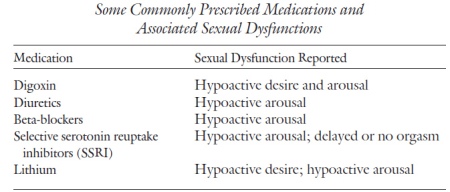Drugs (medically prescribed, alcohol, nicotine, caffeine, illicit drugs) are consumed to cure, to calm, to stimulate, or to avoid physical and psychological pain. The body affected by drugs is a body with altered sexual responsiveness. Therefore, ingested drugs must be recognized as possible causes of sexual dysfunctions and disorders.
Some drugs are alleged to be prosexual in that they are thought to promote sexual activity. Alcohol, cocaine, and hallucinogens, including amphetamines, fall into this grouping.
– Alcohol is popularly thought to decrease inhibitions about sexual activity. In fact, several researchers over the decades have generally concluded that alcohol has negative physiological effects on arousal and orgasm, to say nothing of the severe health effects that can result from sustained alcohol abuse. But the expectations of both women and men are such that they report increased sexual functioning, even when responding to an alcohol placebo. Thus, the frequent clinical situation is that patients generally believe that alcohol helps them to function sexually, while in fact both its short-term and long-term effects on healthy sexual functioning may be the opposite.
– Cocaine is a drug of abuse that is often linked with sexual behavior. As is often the case with alcohol intoxication, cocaine impairs judgment and often leads to sexual activity that puts individuals at risk for sexually transmitted diseases. Cocaine’s dopaminergic effect increases sexual desire in both men and women but also inhibits orgasm and, given a sufficient dosage, causes erectile dysfunction. Individuals with a cocaine habit will find themselves with increased sexual desire, with little inhibition about the sexual activity, and eventually unable to become aroused.
– Hallucinogens such as LSD, Ecstasy, mushrooms, and amphetamines are commonly perceived to be aphrodisiac in their effect on sexual function. This might be expected given the CNS effects caused by these substances. As Crenshaw and Goldberg noted, “The intoxicated states (however mystical) that occur with hallucinogens involve severe alterations in dopamine, serotonin and excitatory amino acid activity. Phencyclidine (PCP, angel dust), for example, incites potent activity at glutamate receptors, apparently inducing psychoses by altering excitatory amino acids. Given the strong impact of these neurotransmitters on sexual function, both extremely positive and negative sexual effects may be expected to occur.” Relying on intoxication for sexual experience has obvious detrimental long-term consequences.
– Other drugs are decidedly negative in their effects on sexual functioning. Excessive alcohol, chronic nicotine use that has caused cardiovascular disease, some antihypertensives, and many antidepressants—all have been implicated in interfering with sexual function. Table lists some of the more commonly prescribed drugs and their effects on sexual function. This not an exhaustive list, but it provides examples of the reported sexual dysfunctions associated with the drugs.
Given the various effects that drugs can have on the physiological basis of sexual function, the clinician needs to know what drugs the individual with a sexual problem is taking. A complete review of a patient’s use of prescribed, over-the-counter, and possible illegal drugs is essential. Once known, the drugs should be examined for their possible contributory role in the sexual problem.
